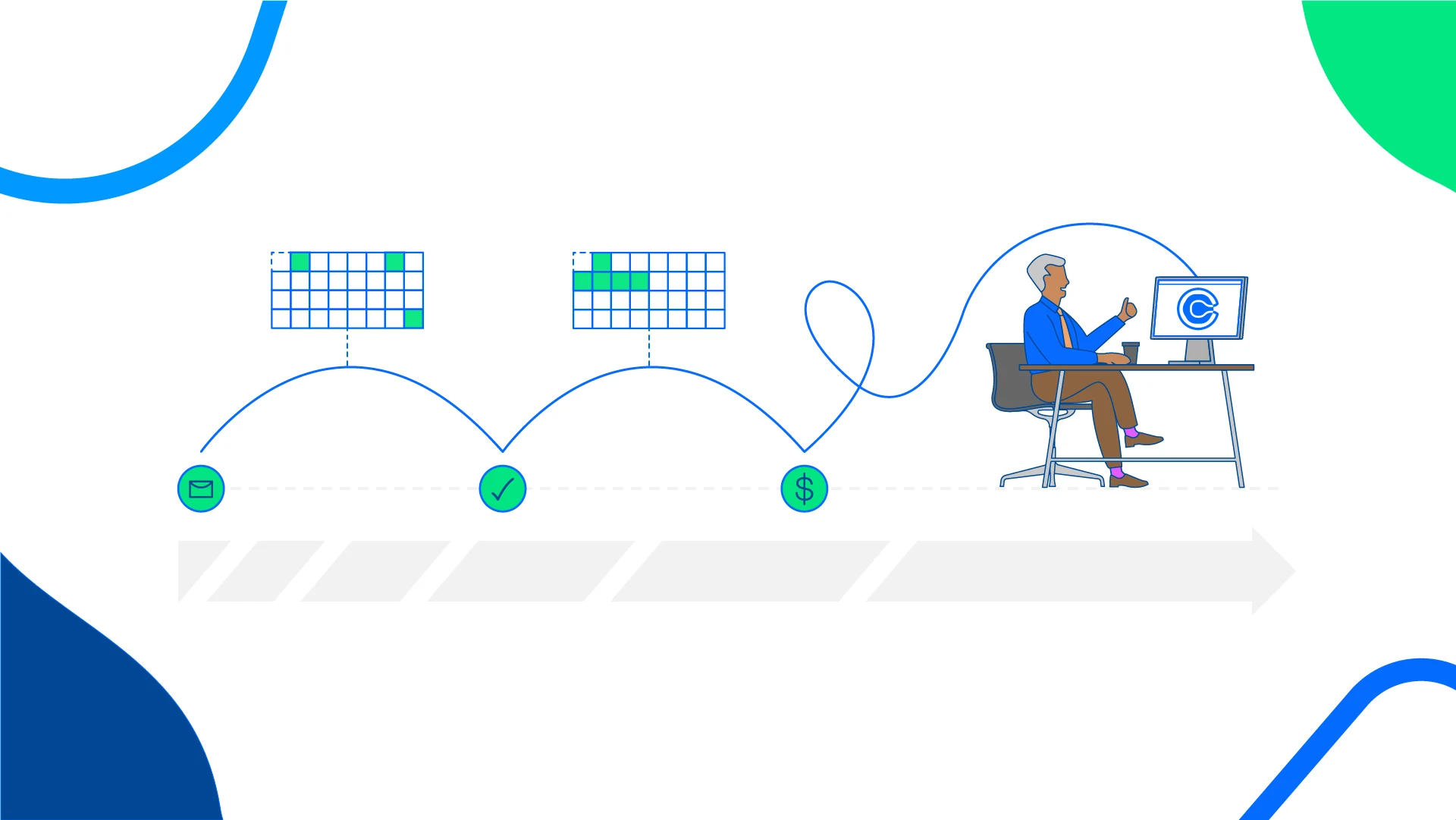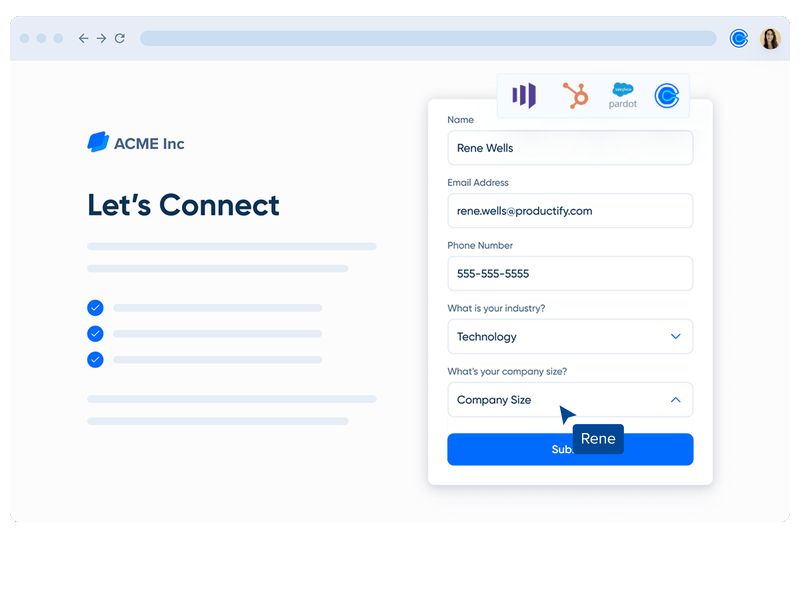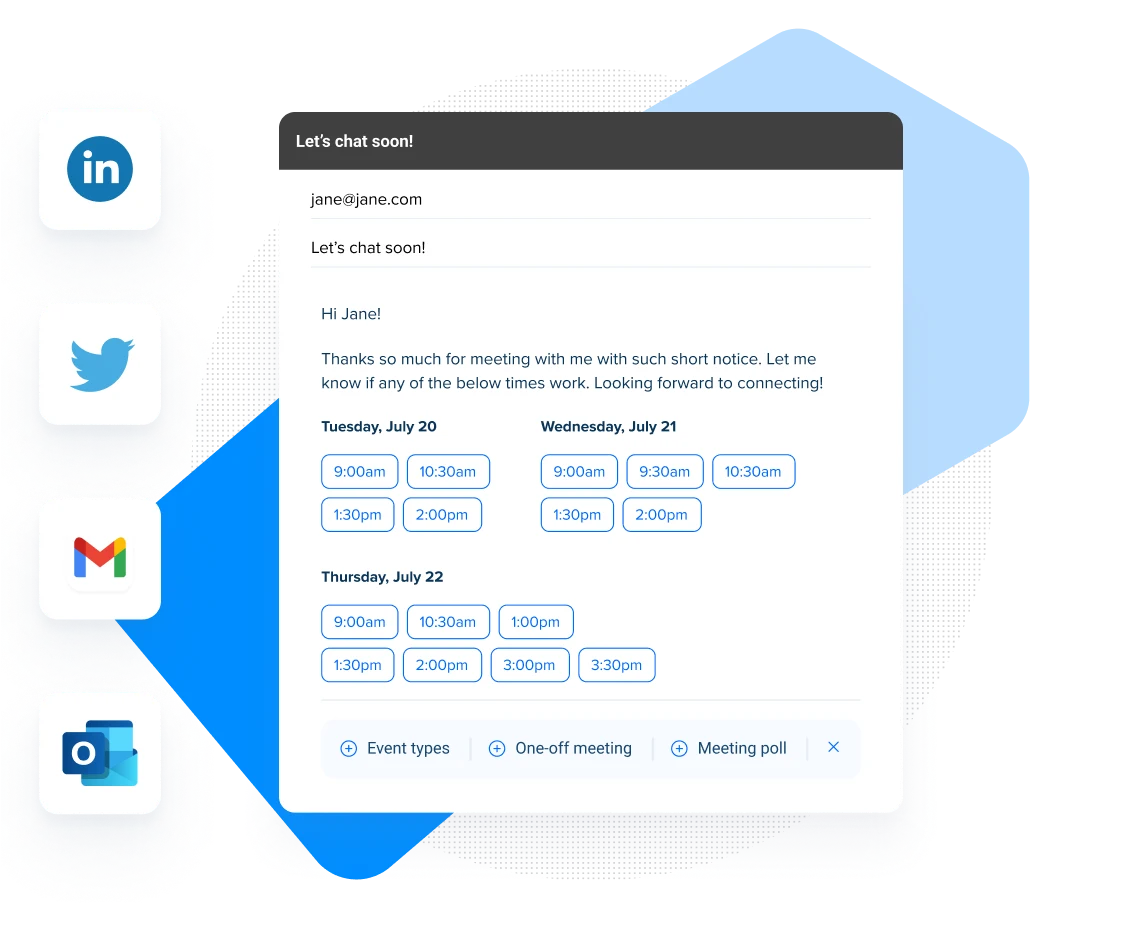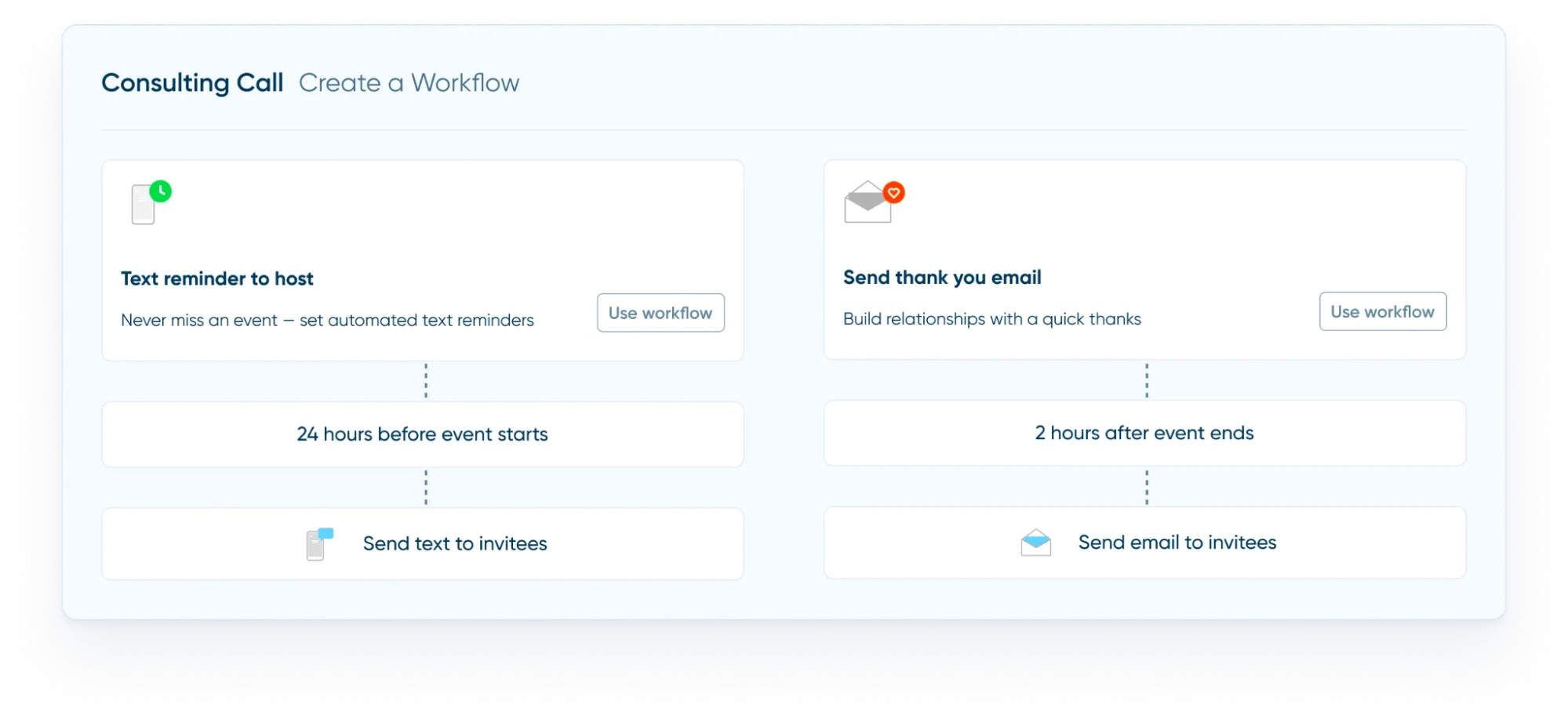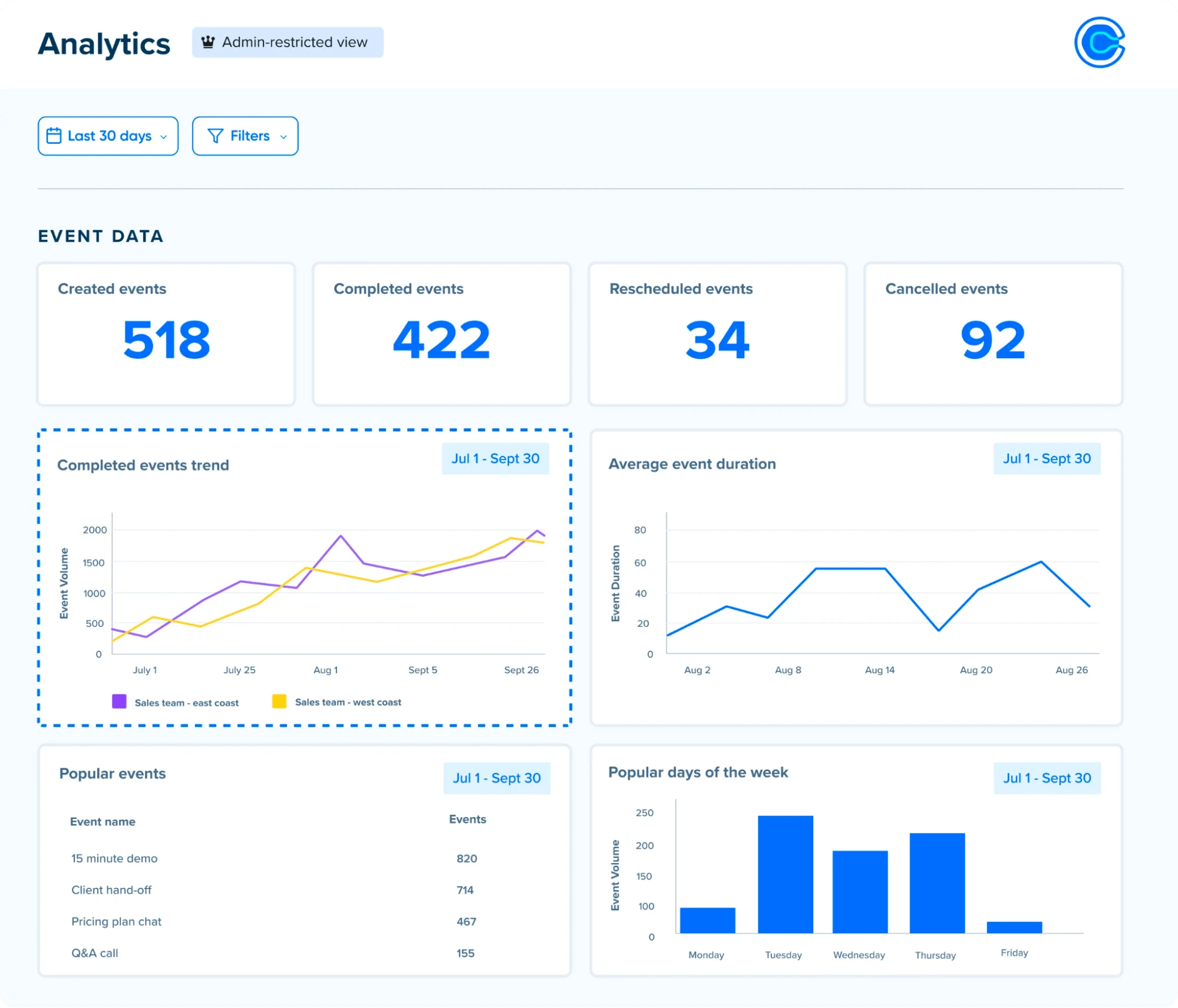Table of contents
Sales reps do more than prospect, qualify leads, and conduct meetings. Behind-the-scenes admin tasks (like scheduling and follow-ups) eat up valuable time that could be spent connecting with prospects and closing deals.
A long sales cycle is a major pain point for salespeople across industries. The median B2B sales cycle length is 2.1 months! When you make scheduling automation part of your sales process, repetitive tasks won’t slow down the buyer’s journey or disrupt deals. That means big wins for your sales team:
Turn website visitors into qualified leads and booked demos.
Eliminate the back-and-forth of scheduling meetings.
Stop spending time manually assigning leads.
Align sales and marketing teams.
Create a better experience for potential customers.
Keep high-quality leads from slipping through the cracks.
Speed up your entire sales pipeline!
Follow these eight tips to add scheduling automation to your sales process and give your team more time for what matters most: creating relationships that drive revenue.
8 ways scheduling automation helps teams close deals faster
1. Qualify and schedule leads from your ‘contact us’ form
Instantly turn website visitors into booked meetings. With Calendly Routing, you can qualify leads from your marketing forms, then automatically route them to a meeting booking page based on their responses. Capture ideal customers at the height of their interest and close deals faster than the competition.
Calendly Routing works with HubSpot, Marketo, Pardot, and Calendly forms, so you can create a seamless handoff from marketing to sales — and no high-value prospects slip through the cracks.
“Our HubSpot form conversion rates have skyrocketed with Calendly Routing. We’re now seeing 70% of qualified leads booking demos directly from our website. Our entire team is thrilled.”
Max Friedman
CEO at Givebutter
2. Automatically match known leads to their Salesforce account owners
When you integrate Calendly with Salesforce, you can send known leads or customers from your website form directly to their account owner’s booking page, a Salesforce best practice. A behind-the-scenes Salesforce ownership lookup means no one has to spend valuable time manually reassigning leads.
“The Salesforce lookup is a game changer for our sales team. They no longer spend 5+ hours a month reassigning website demos.”
Abbie Deaver
Director of Marketing at RCReports
Webinar: How to Fill Pipeline Faster with Calendly Routing
3. Let prospects schedule right from their inbox
Add a scheduling link to your email marketing campaign CTAs to create a direct channel to your reps. Let interested prospects book a sales call without a lengthy email exchange — and immediately put leads in your funnel.
Calendly’s mobile apps, browser extensions, and Outlook add-in also make it simple for sales reps to share scheduling links and calendar availability in emails and LinkedIn messages. Prospects can book a meeting or demo without ever leaving their inbox.
4. Distribute leads with Round Robin automations
Move leads through your funnel more quickly using a scheduling platform with Round Robin distribution. Calendly’s Round Robin Event Type automatically assigns new meetings to team members.
Calendly looks at the availability of every team member and assigns the meeting to a rotating host based on customizable event logic. You can choose equal distribution, assign to the first available rep, or prioritize specific team members.
Round Robin meetings let sales teams respond to meeting requests faster and save time manually assigning leads. If priorities change after a meeting is booked, admins can switch meeting assignments between team members without changing the prospect’s preferred time.
Need more scheduling flexibility? You can add hosts who will always attend the meeting alongside Round Robin assignees. For example, speed up scheduling product demos by adding two hosts: (1) the prospect’s assigned sales rep and (2) the next available member of your sales engineering team. Easily get the right combination of teammates together for onboarding calls, renewal conversations, and more.
5. Bring groups together quickly without scheduling headaches
Complex deals require many meetings with teams and stakeholders inside and outside of your organization. Calendly’s collaborative scheduling features align team members’ calendars, so you can make it easy to include everyone without time-consuming back-and-forth emails.
When you need multiple team members to co-host a meeting — like a demo with an account executive and sales engineer — Collective Event Types pool the availability of everyone in a group. Prospects can only select meeting times that are open on every host’s calendar. Group Event Types let multiple people sign up to meet with you at once for events like webinars and training sessions.
6. Choose tools that play well together
Let your team keep the tools they already use and love, so they can boost productivity without reinventing the wheel. Calendly offers over 100 integrations, from calendars and video conferencing to CRMs and marketing automation tools.
Reps will spend more time converting leads, and less time juggling multiple calendars or copying info between platforms. For example, with the Salesforce integration — which is included in Calendly’s Teams and Enterprise plans — Calendly automatically updates your Salesforce data with meeting and prospect information. No more manual data entry or chasing down reps with last-minute questions.
7. Keep prospects engaged between meetings
Don’t let prospects slip through the cracks. Calendly Workflows help automate, standardize, and manage communications that should happen before and after meetings.
Nurture leads and build trust while decreasing no-shows and busywork for reps. Set up pre- and post-meeting automations to send email or text reminders, share more information, send thank-you notes, and request follow-up meetings. Use a Calendly template or build your own Workflow from scratch.
8. Discover scheduling trends with reporting
With robust analytics and reporting dashboards, Calendly Analytics helps teams identify key metrics, benchmarks, and trends— like popular meeting times, top performers, and in-demand meeting types — and make improvements where needed.
Users can easily access their personal scheduling stats, while admins can view org-wide meeting analytics on their custom dashboard. Admins can then drill down into the data with filters by individuals, teams, groups, or Event Types. When you integrate Calendly with Salesforce, you can unlock even more sales and pipeline reporting.
Close high-value deals faster with scheduling automation
Scheduling automation platforms like Calendly keep the buying process moving forward, so your team can spend more time on what they do best: engaging prospects and closing deals.
“A good tool is one that’s so simple, sales reps can basically forget about it and let the meetings roll in. That’s essentially what happened when we implemented Calendly.”
Julia Pan
Sales Enablement Manager at SignPost
More than 93% of sales teams achieve faster sales cycles with Calendly. Join them and turn site visitors into booked meetings, instantly qualify high-value leads, speed up your sales cycle, and increase revenue.
Ready to help your team hit their sales goals? Get started with Calendly today.
Get started with Calendly
Rachel Burns
Rachel is a Content Marketing Manager at Calendly. When she’s not writing, you can find her rescuing dogs, baking something, or extolling the virtue of the Oxford comma.
Related Articles
Don't leave your prospects, customers, and candidates waiting
Calendly eliminates the scheduling back and forth and helps you hit goals faster. Get started in seconds.
Calendly eliminates the scheduling back and forth and helps you hit goals faster. Get started in seconds.

